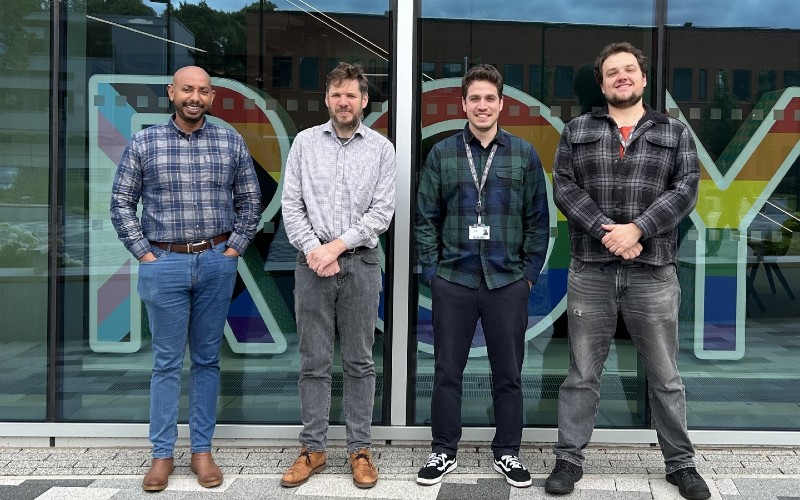A team of Manchester scientists have secured more than £2.5 million investment (€3m) to bring a lithium-free energy storage solution to the global market.
Long-term energy storage – or energy storage with a duration of at least ten hours – is key to supporting the low-carbon energy transition and security.
It will enable electricity generated by renewables to be stored for longer, increasing the efficiency of these environmentally sustainable technologies and reducing dependency baseload imported gas and coal-fired power plants. It will also help drive the multi-billion global market which is, currently, inadequately served with current market-ready technologies.
HalioGEN Power – a spin-out founded by The University of Manchester Professor Robert Dryfe and, with Research Associates Dr Lewis Le Fevre, Dr Andinet Aynalem, and Dr Athanasios Stergiou – has created a technology that has the potential to store energy and efficiently provide power without using critical raw materials.
HalioGEN Power’s team have achieved this by developing a redox-flow battery technology that does not require the use of membrane. By eliminating the need for a membrane, this technology is one of the world’s first long-term storage solutions to negate the use of lithium. Instead, by manipulating the halogen chemistry, the team has been able to create a two-phase system, where the interface between the two phases acts as a membrane.
Unlike current market-established technologies that use lithium metal and can only store energy efficiently for up to four hours, HalioGEN’s redox-flow batteries can store energy for more than ten hours.
In addition, the technology requires just one tank and one pump, instead of two for conventional flow batteries. This not only reduces the capital cost of the system, but also reduces the complexity of the battery design.
The new funding is provided by SPRIND, The German Federal Agency for Disruptive Innovation, following the successful creation of a lab-based protype by the HalioGEN Power team. The prototype phase took place within the Henry Royce Institute labs, using an initial €1 million investment, also provided by SPRIND.
EnviroTech 50 – UK’s most innovative green technology creators
The seed funding will now be used to scale and de-risk this protype over the next 18 months, preparing its route for commercial application.
During this 18-month lab-to-market acceleration period, HalioGEN Power will be based in the Graphene Engineering Innovation Centre (GEIC) at The University of Manchester. Despite its infancy, the firm says it has already received expressions of interest from various organisations from the UK and Europe, including energy suppliers and energy solution providers, keen to apply its technology.
The HalioGEN Power project team will be led by the co-founders, who will each take key roles in the business structure. Dr Lewis Le Fevre will operate as chief technology officer, Dr Andinet Aynalem as principal scientist and Dr Athanasios Stergiou as senior scientist, with Professor Robert Dryfe overseeing all activity.
“Our goal is to bring to market a new, disruptive energy innovation that helps address global energy transition and security challenges, while also tackling geo-specific issues that threaten the stability of the grid, such as the so-called ‘dark lulls’ in Germany,” said Dryfe, Professor of Physical Chemistry at The University of Manchester.
“These lulls see the country go for up to ten days without significant solar and wind energy generation.
“Our redox-flow battery technology creates long-term storage to navigate issues like this in order to maximise the environmental and economic sustainability of renewable energy systems.”
As part of this development stage, SPRIND will provide financial support and mentorship. SPRIND is part of the German Federal Government and has been set up to support innovators from Germany and neighbouring countries, creating a space where they can take risks.
Professor Dryfe also co-founded Molymem, a breakthrough water filtration technology, which has already secured £1m in investment to scale up its technology.
Delivery platform that raised $100m in investment is sold for £66.73


